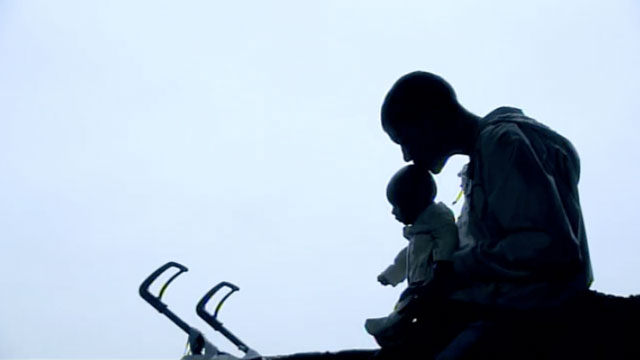Director Darren Thornton comes from a theater background and Frankie, his lauded short film, honors that heritage. It is practically a monologue, but instead of a spotlighted stage this is a film of quick cuts and cutting truth—shot and edited in an aggressive and dynamic docu-style by cinematographer Ivan McCullough and editor Anna Maria O’Flanagan. Despite these cinematic details, the short is propelled entirely by the transitory musings of its 15 year-old protagonist, brought to life in an revelatory performance by Ryan Andrews.
Frankie is all set to become a father soon. Well, whether he’s set or not, he’s becoming one, and rather endearingly he is determined to be a good one. He’s reading up on prenatal care, buying baby clothes, and lugging around a baby doll for practice. Stacked against him though is a marked absence of role models; Frankie’s own dad skipped out on him when he young, and in carting the doll around town, our young subject helpfully points out for the audience the extent of the social meltdown in his Irish town.
It is easy for film with this subject matter to play cloyingly sweet. If Frankie overcomes his circumstances it is an inspiring story of maturity, responsibility and man’s ability to overcome himself and his surroundings. An uplifting moral lesson for all. Frankie however is on a fast track to becoming a piece of work himself. Anti-authoritarian by nature, conflict seems to follow him wherever he goes: the clinic where he attempts to sit in on a lamaze class, the courts which he frequents for shoplifting and fighting, the school from which he dropped out. As an audience we root for the earnest sincerity in Frankie’s voice towards his own self-improvement but the film remains ambiguous and does not encourage a blind faith in happy endings. Mr. Thornton has reason for his skepticism, in an interview, he tells of how he drew inspiration for the film from his experiences in teaching Drama at a center for wayward youth.
Winner of the Berlinale film festival in 2008, the success of Frankie is just part of a run of strong festival performances by short films produced through the Irish Film Board’s “Short Cuts” scheme, a hot streak that has culminated in back to back Oscar nominations for New Boy and last year’s The Door. Several national film boards would love to have that kind of track record, but perhaps more exciting than the acclaim such success wins for regional loyalties, is the flickering sense of a regional identity beginning to form. Frankie feels very a part of an ongoing conversation of U.K. filmmakers to re-explore the social realist film, a powerful movement in British cinema that is nonetheless 40 years out of favor. Alicia Duffy’s heartbreaking The Most Beautiful Man in the World, certainly represents a poetic end of this spectrum, while Soft, which we reviewed but is no longer online, takes it to its confrontational core. Mention of Connor Clement’s coming-out masterpiece James, should not be neglected in such a discussion, nor of course should Andrea Arnold, the current model success story for all those who create short films via film board grants. Ms. Arnold achieved impressive fame for her short film Wasp, and just turned in the most substantial entry to this nascent movement, if it can be called such, with her excellent second feature, Fish Tank.
These filmmakers have created works which revive the social realist tradition, but also take it in new directions. Interestingly, all the above examples direct their lens to the experiences of children. Perhaps spurred on by the unique challenge of representing faithfully the point of view of such young subjects, these filmmakers have refused to be hemmed in by the neo-realist orthodoxy of the original British “New Cinema”, and instead are willing to be more expressive and formalist in order to relate the essence of their young protagonist’s world, rather than solely its trappings.
The result has been some damn fine work, and hopefully a desire of talent in the in UK to further the strong beginning these films have made, turning neo-social realism into a legitimate movement and an identifiable source of attention and acclaim for filmmaking in the region.

 Jason Sondhi
Jason Sondhi